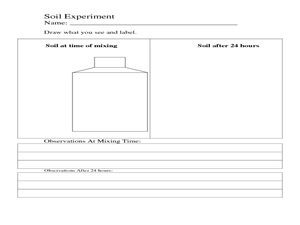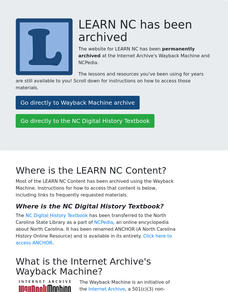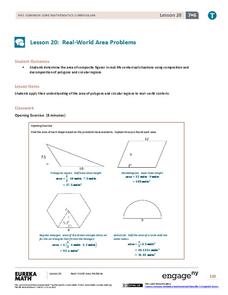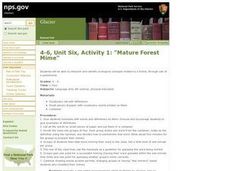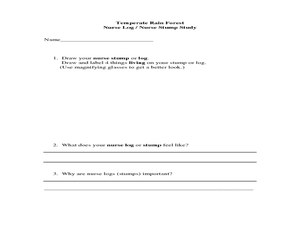Curated OER
Under Our Feet
Students investigate the forest ecosystem to learn of the living and non-living elements of the soil. In this ecosystem lesson, students examine soil for twigs, moss, fungi, leaves, roots and other matter. Students...
Curated OER
Fossil Formation Fun
Students compare the three types of fossils: preserved organisms, mineral replacement fossils, and impression fossils. They create a model of amber,
sponge fossil, and make traces of fossil.
Curated OER
Life in a Log
Students identify insects living in rotting logs. In this decomposition instructional activity, students observe pieces of a rotting log, they look at the insects that have inhabited the log and create a chart that shows their findings.
Curated OER
Activity #18 Decompostion of Baking Soda
Middle schoolers observe what occurs as baking soda is heated. They explain why a chemical rather than a physical change occurred during the procedure. Pupils identify the tpe of reaction (decomposition). Students conduct a glowing...
Curated OER
Composting
Young scholars discover the concept of decomposition. They examine how it makes the soil more fertile and how it helps plants. They put a compost bin in their backyard and record their observations.
Curated OER
Types of Chemical Reactions
Students conduct labs to gain an overview of chemical reactions. They observe examples of synthesis, decomposition, single displacement and double displacement reactions. They identify certain products by the use of litmus and splint tests.
Curated OER
Help Wanted: A Lighting Engineer For Popular Rock Group
Young scholars are assigned to groups, and determine each member's role in the group. They will design an experiment to determine a way to produce the three primary and five secondary colors. Students discuss color and mood. They listen...
Curated OER
Soild Waste and Recycling
In this unit of lessons, pupils examine solid waste and recycling. They discover the concept of decomposition. They also observe the decomposition process and make observatins.
Curated OER
Water Quality and Nitrates & Phosphates
Students examine the effects of nitrates and phosphates on the dissolved oxygen levels in different water sources. For this series of 3 lessons, they consider the reasons for nitrate and phosphate level increases and their effects on...
EngageNY
Real-World Area Problems
Not all structures take the shape of a polygon. The 21st lesson in a series of 29 shows young mathematicians they can create polygons out of composite shapes. Once they deconstruct the structures, they find the area of the composite figure.
California Academy of Science
Carbon Cycle Role Play
Anytime you make concepts clear with role playing or hands-on experience, it's a win for the whole class. Ping-Pong balls are used to represent carbon in a carbon cycle role-play activity. In small groups, children first discuss what...
Curated OER
F.B.I.
Students create a worm bin full of fruit and vegetable scraps wit paper and observe what happens over time. In this decomposers lesson plan, students observe that the fruit and vegetable scraps become new soil.
Curated OER
Soil Composition
Young scholars examine soil. In this soil composition instructional activity students participate in soil sedimentation and filtration activities. The young scholars discuss what non-living and living things are in soil and why it is so...
United Nations
Compost Monitor Training
What should go in the trash, and what can be composted? Guide your young conservationists through the process of composing their trash with a lesson about the different ways we can dispose of garbage. Using a trash bag with clean...
Curated OER
School Forest
Sixth graders explore the concept of biodiversity. In this biodiversity lesson, 6th graders discover a variety of planets and animals that live in forests, and how a rotting log benefits that environment. Students also locate...
Maryland Department of Natural Resources
Eyes on Dissolved Oxygen
Learn about the factors that affect the way oxygen dissolves in salt water with a chemistry lab. After studying the molecular structure of water, young scientists figure out how aeration, temperature, and organic waste affect...
West Contra Costa Unified School District
Solving Exponential Equations
The power to solve exponential equations lies in the resource. Scholars first learn how to solve exponential equations. An activity matching cards with equations, intermediate steps, and solutions strengthens this skill.
National Renewable Energy Laboratory
Biomass: Biogas Generator
It's a gas. Middle schoolers build a biogas generator following the directions in this resource. After a few days of observation, they demonstrate that the gas given off by the decomposing manure is flammable. The activity concludes as...
Curated OER
Mature Forest Mime
Learners come to understand vocabulary words through pantomime. In this vocabulary lesson, students first review several vocabulary words and their meaning, then they work in groups to pantomime the definitions.
Curated OER
Nature's Recycling Program
Students identify what materials make up compost. In this science of recycling lesson, students explain the benefits of composting determine how compost is a good plant fertilizer.
Curated OER
Temperate Forest : Pacific Spirit Field Trip
Students examine nurse logs with hand lenses and identify animals. In this ecosystem lesson, students gain understanding of the rainforest by studying nurse logs. Students become familiar with vocabulary through their study...
Curated OER
What Causes Tooth Decay
Students investigate oral hygiene. In this personal health lesson plan, students discover the parts of a tooth and how to best protect them from disease. Students examine the effects of acids on tooth enamel and calcium.
Curated OER
All A-buzz About Math
Second graders participate in Math-Eze activities to comprehend word problems. In this word problem instructional activity, 2nd graders recognize why a hexagon is the best shape for a beehive. Students calculate how far bees must travel...
Curated OER
Urban Life: What Lives In Our Local Park?
Fifth graders participate in activities during a visit to Central Park. In this urban life lesson, 5th graders visit Central Park where they explore pond dipping, stream chemistry, and play a native plant Bingo game.
